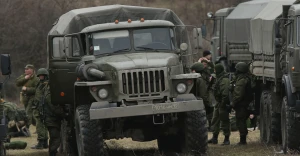
Gershkovich's exchange may be related to WSJ's article on Nord Stream explosions - political analyst
Executive Director of the Institute of World Policy Yevhen Mahda speculates why The Wall Street Journal reported on the alleged sabotage of Nord Stream
He said this on Espreso TV.
"Always in such cases, you have to look at who benefits. I believe that the article was not accidentally published during the Kursk offensive of the Ukrainian Defense Forces to discredit it. And why the WSJ? Let's remember whose journalist was detained in Yekaterinburg and recently exchanged. I assume that quite realistically, an element of Evan Gershkovich's return was an agreement with the Russian special services that the WSJ would facilitate the appearance of such materials. This is classic real-politic. I would not want to be accused of leveling the influence of Western media, although it is difficult to level it because of its competitive nature. But when reputable Western media have repeatedly promoted Russian propaganda theses, it is no accident," Mahda said.
According to him, these theses also show that Valerii Zaluzhnyi's popularity remains high.
"Russia is interested in driving a wedge between Zaluzhnyi and Zelenskyy and neutralizing Zaluzhnyi's influence. We must understand that it does not matter to Russia who is president or commander-in-chief of the Armed Forces. They see Ukraine only in a subjugated form, only as one that has surrendered. There is no other approach," he added.
What is known about the Nord Stream explosions
On the night of September 26, 2022, a sudden drop in pressure occurred in the Nord Stream 2 gas pipeline. On September 27, it became known that gas from the Russian Nord Stream 2 gas pipeline had leaked into the Baltic Sea on the eve of the launch of the Baltic Sea pipeline.
Experts have found that a man-made explosion with a capacity of about 700 kg of TNT equivalent occurred on the routes of the Nord Stream and Nord Stream 2 gas pipelines in the Baltic Sea on September 26. NATO Secretary General Jens Stoltenberg called the incident a sabotage.
Media in the United States and Germany investigated the Nord Stream accident, seeing it as a trace of pro-Ukrainian forces, but officials in the countries and NATO advised to wait for the results of the investigation. The President's Office denied Ukraine's involvement.
On August 14, the German General Prosecutor's Office issued the first arrest warrant for a Ukrainian in the case of the Nord Stream gas pipeline attack. The suspect is currently being sought.
Deputy spokesman for the German Federal Government Wolfgang Büchner says that the results of the investigation into the sabotage of the Nord Stream gas pipeline will not harm relations between Kyiv and Berlin.
The Wall Street Journal wrote that Ukrainian officials were involved in the explosions. However, the President's Office responded to the publication and denied Ukraine's involvement in the Nord Stream explosions.
- News














































